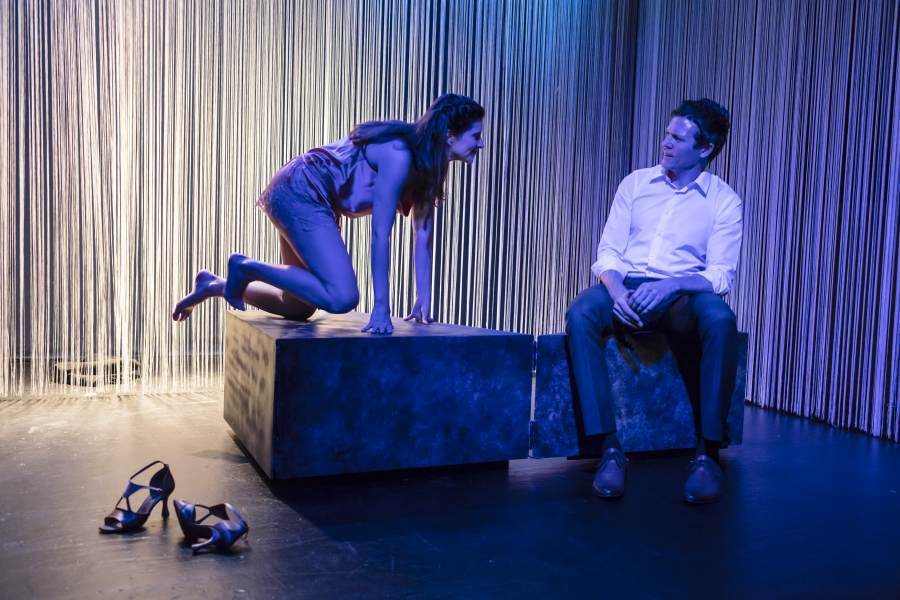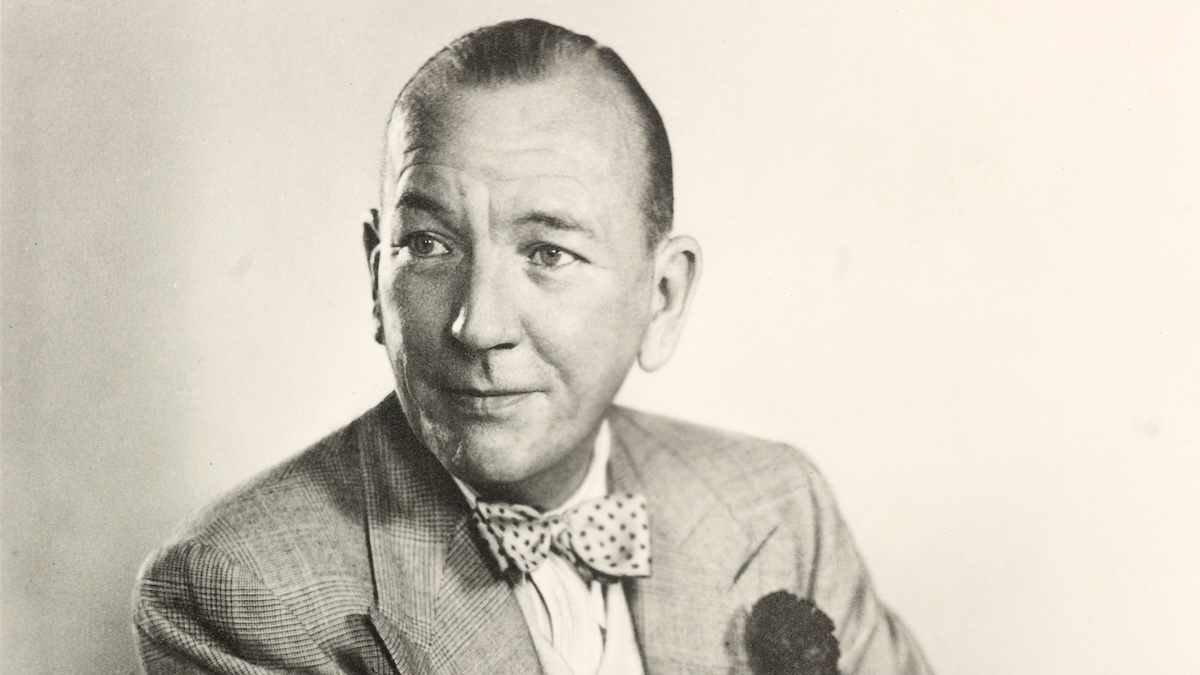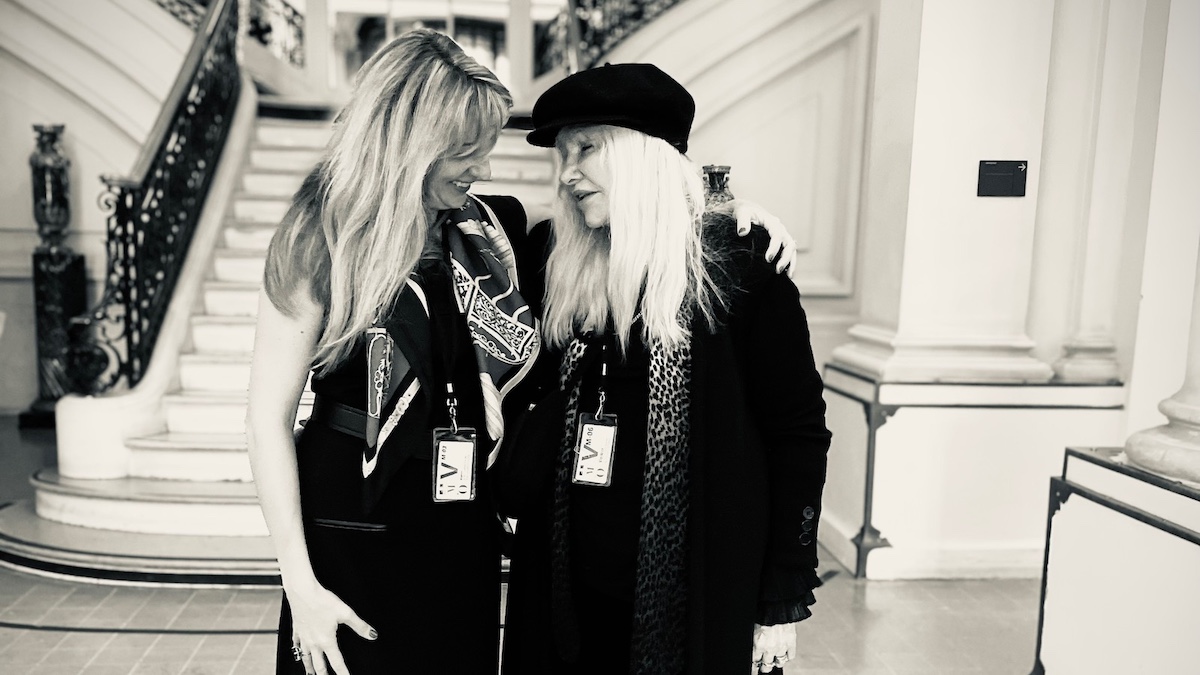
Allison Threadgold, the producing body behind Stripped Scripts, began her relationship with playwright Kieron Barry seven years ago when they met in a California coffee shop to discuss Kieron’s new play Tomorrow in the Battle. Stripped Scripts has gone through many changes since 2010, the biggest one being relocating to New York City, but Kieron’s beautiful and heartbreaking play continued to have an impact on the company.
I met Allison in 2016, when she auditioned for a play I was casting. The next morning, she sent me the script for Tomorrow in the Battle. I read the play in one sitting, and although the structure of the play and weight of the story were intimidating, I was so captivated by Kieron’s blending of poetic language with razor-sharp honesty that I agreed to direct the play immediately. This past October, Stripped Scripts produced Tomorrow in the Battle as their first full scale production, giving the play its New York City Premiere.
Now, with our show closed, our dedicated and talented cast and crew home from battle, and Kieron back in England, I asked him a series of questions about this play, his past work, and what’s yet to come.
Kieron, 16 of your plays have been produced in the UK, US, Canada and South Africa. When did you make the decision to pursue playwriting? Can you remember the first time you produced a piece of writing that you felt proud of?
The decision to pursue a career as a playwright was not an entirely conscious one, and indeed ‘playwright’ feels slightly too grand a word for what I am. I note that David Hare styles himself a dramatist, although I can’t work out if this term is more illustrious or less. ‘Playwright’ is a useful expression, though, in that it reminds us that making plays is a craft rather than an art, and as such we should be stored alongside wheelwrights, wainwrights and arguably Dame Joan Plowright.
Quite by accident I had spent a lot of time in theaters as an undergraduate, writing music for plays and comedy revues. I loved the environment, and I felt at home amid theatre folk – loose gangs of rangy outsiders knitted together with fondness and anxiety.
A series of impulses led me to try writing sketches myself, and then plays. Every single line I wrote for the first few years was wholly without merit, but then in play number four I had a character say, at an impasse in a domestic argument, OK. Well. Look. When delivered on stage the line exhilarated me: at last I had worked out how people spoke. After half a decade’s digging, a piece of coal! An ordinary and all but unnoticeable piece of coal, but what a thrill to hold it in my dusty paw at last.
I still look tenderly to the novel for its peerless ability to convey the inner life, but the bliss of having an actor like Tamsin Greig play a character you have created is a pleasure I wish everyone could experience. Thus I stick with the stage.
Your plays vary quite a bit in style, and have been classed as “verbatim dramas,” “monologue plays,” “rom-coms” and “meta-theatre.” Would you say all of your plays have a similar thematic undertone? If so, how would you describe it?
I am always stumped by the second question I get asked at parties: What kind of plays? Sometimes I’ll talk about one particular play of mine – the documentary piece about terrorism, say, or the comedy set in a girls’ boarding school. But if there is anything that links them all, I haven’t found it yet, and I weakly announce as much. (The third question is always: Any musicals?)
My father occasionally tells me that everything I write is about betrayal, but part of me suspects that’s true of all drama. I never understand my work or how I do it, whether at the time or afterwards. My creative process feels more like a destructive process – a guilty, furtive binge. Like giving in to a long-standing addiction; once again I’ve let myself down. When I’ve finished something I have no idea what it is, to the point of a couple of times discovering that what I thought was a serious drama is being casually treated as a comedy.
Your play Tomorrow in the Battle tells the story of obsession and betrayal using a very flawed cast of characters from London’s elite. When writing the play, did you worry that the characters would not be likable? Did you find it difficult to relate to the characters when watching the staged productions? Or did they appear more honest because we recognize the flawed parts of ourselves in them?
I didn’t worry that the characters were unlikable until everyone started saying do you worry that these characters are unlikable? I panicked a bit then, and considered making them likable, but I realized I wasn’t quite sure what likable actually meant. Should they give more to charity, or do the washing-up?
There must be more to it than that, surely. But what? Weirdly or not, most of us respond with private glee to the cynical snob Becky Sharp while dreading the virtuous Little Nell.
In theatre, I suspect likability lies chiefly within the province of the actor rather than the writer. David Tennant querying your dress before the party feels rather different from Alan Rickman doing so. And in our own lives there are countless examples of two different people saying or doing the same offensive thing, but one we smilingly forgive and the other we angrily resent.
Of course, the script implies that the characters are wealthy, and for some people this makes them immediately and inherently unlikable. Those people should either be prevented from ever going to the theatre again, or forced to watch every single play ever.
In the script of Tomorrow in the Battle, there is no stage direction or indication for blocking. Now that the script is published, do you anticipate the upcoming productions will be drastically different in staging and interpretation? Does that make you excited or afraid?
I have a very limited visual imagination, and even blocking fills me with a paradoxical mix of fear and boredom. I write almost entirely abstractly, always with the vague sense of oh, they’ll sort this out. This airy, semi-regal approach reached its psychological nadir when I arrived in upstate New York to see a production of an autobiographical play of mine (see below). The play, I suddenly remembered as I took my seat, included the stage direction “Kieron performs loud and enthusiastic oral sex on Jade.” It is beyond my abilities to describe the silent commotion I underwent as the scene approached.
With Tomorrow in the Battle, the right director and set designer will be as excited about how to stage the play as I was about how to write it. As soon as I stipulate something tangible in the staging, I have constricted the vision of a fellow artist. There is risk in all collaboration, of course, but regular disasters are a small price to pay for occasional triumphs. I feel strongly about the text, and the pace at which it is delivered, but that’s about it. It’s possible, I suppose, that Yasmina Reza when writing God of Carnage rang someone to check whether the technology existed to allow a character to vomit after a long sequence of dialogue, but it’s more likely that she just hoped for the best.
In your play Tomorrow in the Battle, the characters consistently find themselves in situations where their actions dramatically impact others, sometimes to a point of life or death. Was our current political climate an inspiration in writing this play? Why does this play an important role in today’s world?
I find ‘relevant’ plays to be boring and pedantic on the whole. The journey from blank page to full house is so long that everything you write is guaranteed to be out of date by the time it reaches its audience. That’s why God invented newspapers (and why the Devil invented Twitter). I have no desire whatsoever to see a play about the current political situation in the US, for example; indeed I go to the theatre to avoid all that rot.
Regarding Tomorrow in the Battle, clearly the issue of the renewal of the Trident nuclear weapons programme, in the UK at least, is currently on people’s minds, but I don’t think its meaning or impact would be diminished if the issue had been put to bed decades ago. Human nature is unchanged since the Garden of Eden, and it’s that which we are desperate to see acted out on stage. I’m no
t confident I’ve ever seen a cherry orchard, for example, still less owned one or witnessed one being chopped down, but I don’t feel this distances me from Chekhov’s drama.
Your plays are full of image-driven lyricism, searing honesty, and hysterical analogies. What is your favorite line of text you’ve ever written?
You’re very kind! The imagery and the analogies make people consider something in a new light, I suppose, or help paint a picture or convey a sensation. But the goal is really to get audiences to bypass thought entirely and express themselves via the two most immediate forms of emotional response: the laugh and the gasp. They are the only two reactions worth receiving in the theatre (and of course among the worthless we must include the dreaded, empty ritual of the standing ovation). Gasps are difficult to predict and impossible to rely on, but it does feel wonderful to come up with an all-weathers laugh line. I took particular delight when, in a play I wrote called Why Are We in Afghanistan?, I was able by painstaking narrative preparation to bring the house down with the single-word punchline, Ikea? The moment ranks with the great kisses of my life.
You recently wrote a play titled The Official Adventures Of Kieron & Jade, which chronicles the collapse of your own relationship. Could you describe the experience of watching this play performed on stage for the first time?
In 2015 I at last achieved the long-coveted triple: broken heart, nervous breakdown and midlife crisis. One of the many under-recognized benefits of such a grand slam is the end of embarrassment; when they’re shaving your chest in the ambulance to apply the paddles you note with distant joy that the largeness of your nose is now irrelevant. There are bigger fish to be gutted now.
Such social liberty is good for a writer, although the obvious idea of writing a play about my statistically unremarkable trauma did not occur to me for a long time. For the first few months I was too busy trying to find a way out of bed, and for the next few I could not for the life of me find the sculpture of narrative amid the marble of experience.
This would have been an easier play to write if my relationship had failed on account of an addiction to cocaine and prostitutes. Remorse becomes a writer, and everyone is primed to believe a guilty confession. But I wasn’t sure whether I had anything to confess or not, and pointing a finger at an absent third party unable to defend themselves is conducive neither to decency nor comedy. For I had come to realise that the play could only be a comedy, and in fact my story demanded very little comedic exaggeration.
In a certain way that play was no more autobiographical than any other play of mine. A play that doesn’t seem to be related to my own life allows me to get away with including any weird, private thought I would normally be too embarrassed to ascribe to myself, whereas I knew with this play that every odd fetish and foible I described would be attached to me forever. So a portion of me remained cautious, even as I turned myself upside down and shook me till the coins fell out.
And, boringly or not, I was desperate to be fair to everyone involved. When watching the play for the first time I oscillated between fear that I had gone too far and annoyance that I had not gone far enough. That might suggest the balance was about right.
But it is a strange sensation to hear your own name spoken on stage. That is, if like me you have an unusual one – Johns are presumably used to this. I was lucky, however, that the play had its first run in a part of the world in which not a soul knew me. When we did it in London, though, much of my family was in attendance and it was the closest I’ve ever come to bolting from a theatre at curtain-up. My embarrassment was exactly total, but Keats reminds us that we are at our most human when we blush. As artists we should surely welcome such acute pain.
You wrote and directed the short films Vice and Seconds. Did you enjoy the process of directing your own work? Would you ever consider directing one of your stage plays?
I love directing film. The process, particularly if it involves an element of producing as well – which, let’s face it, it always does – is like a cross between organizing a wedding and coordinating the search for the body of a missing child. Great and glamorous excitement and then suddenly a swerve into awful, sickening dread. I have a cousin who is a far more successful writer and producer than I am, and I went to watch his TV series being shot to see how the big boys do it. It turns out they do it just like the little boys do: set up the camera in one direction, then take it down set it up in the other. For the film director, the working day is, amid the mess and the make-shift, just a series of problems to be solved; the only constant one being which things can be jettisoned and still leave you with a just-about-complete film.
But I don’t enjoy directing plays. The rehearsal room feels like a month-long chess match against four opponents. I prefer swanning in here and there as the writer – hardly an event on a film set – and answering a few affectionate questions from the cast.
What’s next? Are you in the process of writing your next play? What do you currently find inspiring?
Yes, what is next? I am gamely battling with a screenplay which really should be finished soon. I think I’m getting there, but every time I sit down with a new script I have the strange sense that I’ve never written anything before and I don’t know how it works or where to start.
My current inspiration is the thought that waiting patiently for me at the end of my writing day is a negroni large enough to stun a mule.
To purchase a copy of Tomorrow in the Battle, click here, and to learn more about licensing a production, click here.

Noël Coward’s Travels

Kate Chopin in New Orleans: Mother-Daughter Author Duo Collaborate on Historical Book

